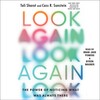Plus, receive recommendations and exclusive offers on all of your favorite books and authors from Simon & Schuster.
Table of Contents
About The Book
Have you ever noticed that what is thrilling on Monday tends to become boring on Friday? Even exciting relationships, stimulating jobs, and breathtaking works of art lose their sparkle after a while. People stop noticing what is most wonderful in their own lives. They also stop noticing what is terrible. They get used to dirty air. They stay in abusive relationships. People grow to accept authoritarianism and take foolish risks. They become unconcerned by their own misconduct, blind to inequality, and are more liable to believe misinformation than ever before.
But what if we could find a way to see everything anew? What if you could regain sensitivity, not only to the great things in your life, but also to the terrible things you stopped noticing and so don’t try to change?
Now, neuroscience professor Tali Sharot and Harvard law professor (and presidential advisor) Cass R. Sunstein investigate why we stop noticing both the great and not-so-great things around us and how to “dishabituate” at the office, in the bedroom, at the store, on social media, and in the voting booth. This groundbreaking work, based on decades of research in the psychological and biological sciences, illuminates how we can reignite the sparks of joy, innovate, and recognize where improvements urgently need to be made. The key to this disruption—to seeing, feeling, and noticing again—is change. By temporarily changing your environment, changing the rules, changing the people you interact with—or even just stepping back and imagining change—you regain sensitivity, allowing you to more clearly identify the bad and more deeply appreciate the good.
Product Details
- Publisher: Atria/One Signal Publishers (February 27, 2024)
- Length: 288 pages
- ISBN13: 9781668008201
Browse Related Books
Raves and Reviews
“Profound...the authors are engaging guides to their field.”
—Financial Times
“Corralling a wealth of fascinating examples…Sharot and Sunstein provide a revelatory investigation of a phenomenon that’s as complex as it is common. This enthralls.”
—Publishers Weekly, starred review
"With intelligence and humor, Sharot and Sunstein provide guidance on how to refresh the spirit and see the world anew. If your world is starting to look grey and dull, this book might be your road map out of the comfort zone."
—Kirkus Reviews
"Look Again is a worthy addition to literature at the intersection of psychology, neuroscience, and economics, making them accessible to the general reader."
—Shelf Awareness
“One trait of history’s most creative thinkers—from Leonardo da Vinci to Albert Einstein—is that they are able to look anew and marvel at everyday things that most people have quit noticing: the alluring blueness of the sky, the passage of time, the way a light beam creates a spot of luster on a leaf. Look Again can help us all look in a fresh way at things around us. It’s a smart and fun read, and a valuable way to revitalize your life.”
—Walter Isaacson, New York Times bestselling author of Steve Jobs
"Timely and important. A clear and provocative book about the power of expectation and the endless mystery of the human mind."
—Tara Westover, #1 New York Times bestselling author of Educated
"A sensational guide to a more psychologically rich life."
—Angela Duckworth, New York Times bestselling author of Grit
"In Look Again, Sharot and Sunstein offer an insightful look into the science of habituation. Their insights into the why and how of getting used to things teach us how to hack habituation to bring more joy to our lives. A surprising and delightful book."
—Annie Duke, bestselling author of Thinking in Bets
"Look Again is the perfect book to help you refresh your point of view. Sharot and Sunstein reveal why it’s easy to be lulled into complacency about anything and how to prevent falling into this trap. In the bargain, they’ll help you live a happier, healthier, wiser and more just life."
—Katy Milkman, bestselling author of How to Change
"Such a vivid, human and original book-the perfect guide to perking up everything from your creativity to your love life."
—Tim Harford, author of How To Make The World Add Up
"Look Again is a fascinating guide to how and why our biased minds get used to stuff and how we can fight through our usual adaptations. It's a must read for anyone who wants to feel happier, stay more present, and make healthier, more effective decisions."
—Laurie Santos, Chandrika and Ranjan Tandon Professor of Psychology at Yale University and host of The Happiness Lab podcast
Resources and Downloads
High Resolution Images
- Book Cover Image (jpg): Look Again Hardcover 9781668008201
- Author Photo (jpg): Tali Sharot Photograph by Michael Lionstar(0.1 MB)
Any use of an author photo must include its respective photo credit
- Author Photo (jpg): Cass R. Sunstein Photograph © Ross Lincoln Harvard University(0.1 MB)
Any use of an author photo must include its respective photo credit











